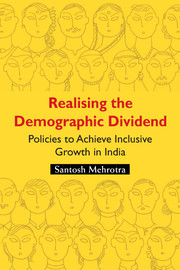Crossref Citations
This Book has been
cited by the following publications. This list is generated based on data provided by Crossref.
Mehrotra, Santosh
Kumra, Neha
and
Gandhi, Ankita
2017.
Towards Universal Health Care in Emerging Economies.
p.
297.
Aliberti, Marco
2018.
India in Space: Between Utility and Geopolitics.
Vol. 14,
Issue. ,
p.
1.
Murthy, Venkatesh
Gaur, Diptanshu
and
Bhaduri, Korak
2022.
Parents, Pupils, Pedagogues, and Policies: A Rectangle of School Education for Immigrant’s Children.
Systemic Practice and Action Research,
Vol. 35,
Issue. 5,
p.
607.
Farid, Shekh
and
Mostari, Mamata
2022.
Population transition and demographic dividend in Bangladesh: extent and policy implication.
Journal of Social and Economic Development,
Vol. 24,
Issue. 1,
p.
108.
Marois, Guillaume
Zhelenkova, Ekaterina
and
Ali, Balhasan
2022.
Labour Force Projections in India Until 2060 and Implications for the Demographic Dividend.
Social Indicators Research,
Vol. 164,
Issue. 1,
p.
477.
Parida, Jajati Keshari
and
Madheswaran, S.
2023.
India’s Contemporary Macroeconomic Themes.
p.
479.
Naraindas, Harish
2023.
Is Medical Tourism Transcultural Hypogamy?.
Studies in History,
Vol. 39,
Issue. 1,
p.
109.
Mehrotra, Santosh
and
Giri, Tuhinsubhra
2023.
Enterprise Informality in India: The Blind Spots in Public Policy.
The Indian Journal of Labour Economics,
Vol. 66,
Issue. 3,
p.
687.
Parida, Jajati Keshari
and
Madheswaran, S.
2023.
Harnessing Demographic Dividend Before it is Lost Forever in India.
The Indian Journal of Labour Economics,
Vol. 66,
Issue. 1,
p.
61.
Parida, Jajati Keshari
Pattayat, Shiba Shankar
and
Verick, Sher
2023.
Why is the size of discouraged labour force increasing in India?.
Economic Change and Restructuring,
Vol. 56,
Issue. 5,
p.
3601.





